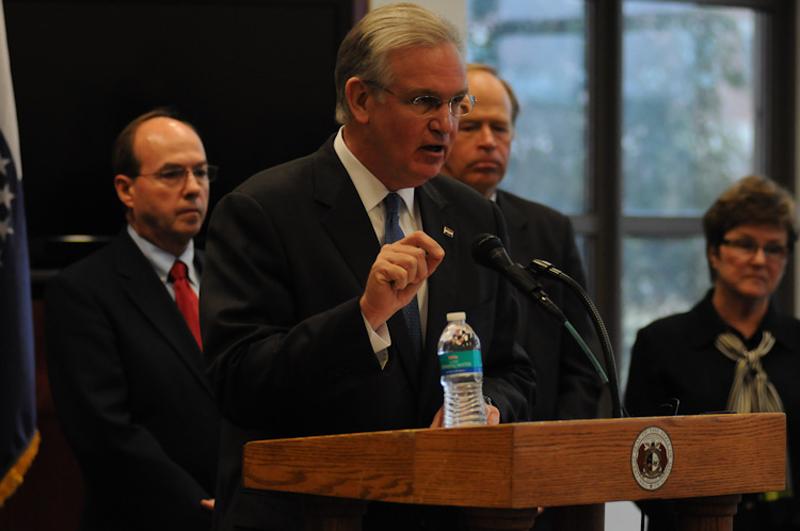Gov. Jay Nixon discussed his plans to expand Missouri Medicaid roles to students, professors, local business leaders and UM Health System officials at the College of Business on Thursday.
Before Nixon’s speech, Harold Williamson, Vice Chancellor for the UM Health System, and Michael Brooks, President of business group Columbia Regional Economic Development, Inc. announced their support for the expansion.
Nixon, who received his undergraduate and law degrees from MU, said he chose to speak at the College of Business in order to emphasize that the Medicaid expansion is a practical business decision for the state of Missouri, not a matter of partisan politics.
“This isn’t the time to re-open the debate or re-argue the merits of the president’s health care plan,” Nixon said. “Congress passed it, the president signed it and the Supreme Court upheld it. It’s the law of the land. But quite frankly, the biggest economic decision facing our state right now is how we move forward on health care.”
Nixon emphasized the economic benefits of the Medicaid expansion, citing a 2012 MU study that said an expansion would bring 24,000 jobs to Missouri in 2014. The study found these jobs would generate $7 billion in new income over the first six years of the expansion.
Nixon thanked MU for authoring the study, which concluded the expansion would be beneficial to the state. He called the findings “unassailable numbers” that helped advance the expansion debate in 2012.
Williamson announced the UM Health System’s endorsement of the expansion, saying the Affordable Care Act assumed states would expand Medicaid, and therefore reduced the funding states normally receive to help offset the costs of treating uninsured patients. Without an expansion, the UM system would lose funding.
“MU Healthcare expects to lose $5 to 6 million a year in the funds known as disproportionate share, or dish payments,” Williamson said. “And, overall, Missouri’s health care and hospitals systems will lose something like $4 billion.”
In fiscal year 2012, the UM Health System provided about $33 million in uncompensated care. Williamson said the Medicaid expansion would help offset the high cost of care, although the UM Health System would try to continue to care for the uninsured if the expansion does not go through.
“If Missouri decides not to accept the Medicaid expansion, MU health care would lose the funding to offset reductions mandated by the Affordable Care Act,” Williamson said. “We’d certainly try to continue to treat large numbers of uninsured patients with no additional funding to offset these costs.”
The rural land around Columbia is home to a substantial population of uninsured people, Williamson said. These uninsured patients can be expensive for health systems, because they can’t afford to seek preventative care and instead must turn to more costly crisis care in emergency rooms.
The Columbia area’s large uninsured population meant UM Healthcare System dealt with 50,000 emergency room visits last year, Williamson said.
Nixon said although expanding Medicaid has economic benefits, it is also a smart decision for the health of uninsured Missourians.
“For all of Missouri’s working families who are uninsured, expanding access to Medicaid is quite simply the right thing to do,” he said. “Here in Missouri we must make what is the smart business decision, the right human decision, and send the tax dollars we sent to Washington back to work right here in Missouri.”








